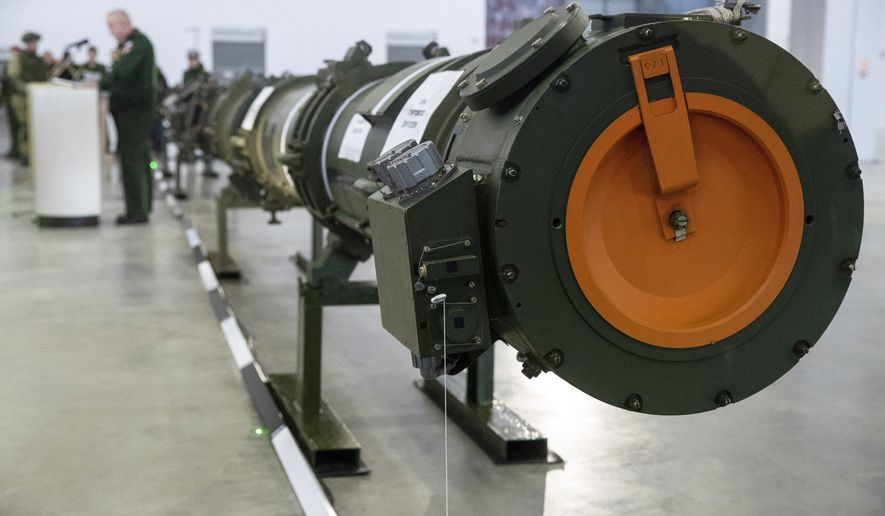The North Atlantic Treaty Organization on Friday declared that “Russia bears sole responsibility for the demise” of the Cold War-era Intermediate-range Nuclear Forces Treaty between the U.S. and Russia as President Trump’s decision to formally withdraw from the agreement takes full effect.
“We regret that Russia has shown no willingness and taken no demonstrable steps to return to compliance with its international obligations,” the NATO Council said in a statement. “A situation whereby the United States fully abides by the treaty, and Russia does not, is not sustainable.”
Mr. Trump in February announced his intent to withdraw the U.S. from the 1987 pact saying Moscow has been cheating for years. The declaration triggered a six-month waiting period for Russia to return to compliance, which expired Friday.
“Today, the INF Treaty ceases to exist,” NATO Secretary-General Jens Stoltenberg tweeted.
The six-month waiting period is standard for most international treaties. It is intended to give the parties a final opportunity to return to compliance or resolve their differences.
The Russian government denies violating the deal and Russian Deputy Foreign Minister Sergei Ryabkov in an interview with the state news agency Tass Friday urged the Trump administration to hold off on developing new intermediate-range weapons.
“We invited the U.S. and other NATO countries to assess the possibility of declaring the same moratorium on deploying intermediate-range and shorter-range equipment as we have, the same moratorium Vladimir Putin declared, saying that Russia will refrain from deploying these systems when we acquire them unless the American equipment is deployed in certain regions,” Mr. Ryabkov said.
But the Associated Press reported Friday that the Pentagon already has plans to test a new missile in coming weeks that would have been prohibited under the treaty, although deployment of any such weapon would be a long ways off.
U.S. officials since 2014 have accused Moscow of breaching the INF, specifically through the deployment of a cruise missile known as the Novator 9M729.
The treaty, which had prohibited the U.S. and Russia from building or deploying land-based missiles and launch systems with a range of 300 to 3,400 miles, was designed to block the spread of so-called “tactical nukes” around the globe, particularly in Europe, partly out of fear the less powerful bombs were more likely to be used in an actual shooting war.
“The demise of the INF treaty is something which we very much regret. At the same time I welcome the fact that NATO has been able to be united on this issue all the way, all allies have agreed with the United States in their approach to Russia,” Mr. Stoltenberg said at a press conference Friday.
Since the withdrawal became official, much of the blame has fallen on the Kremlin, while NATO officials say they will not overreact.
“After many years of hard work on this issue, I am sorry to see this day come,” tweeted NATO Deputy Secretary-General Rose Gottemoeller. NATO “will do what is necessary to ensure its deterrence and defence, in a balanced, coordinated and defensive manner,” she added.
Britain’s Foreign Affairs Secretary Dominic Raab said Russia caused the deal to collapse by “secretly developing and deploying a treaty-violating missile system which can target Europe’s capitals. Their contempt for the rules-based international system threatens European security.”
On Capitol Hill, Republican lawmakers have praised the pullout.
“This decision is not only supported by NATO, but it emphasizes the need to continue to protect America’s national security interests from the threat of a resurgent Russia,” Texas Republican Michael McCaul, ranking member of the House Foreign Affairs Committee, said in a statement Friday.
Opponents, however, say the decision to leave the INF, compounded by the growing belief the New START nuclear arms deal could fall by the wayside, illustrate the Trump White House’s failed approach to international agreements.
“It’s another disastrous Trump decision that will lead us to an arms race. Russia is more than ready and willing to go ahead and invest significantly in increasing in its arms sophistication and its arsenal,” New Jersey Sen. Robert Menendez, the ranking Democrat on the Senate Foreign Relations Committee, said in an interview.
“The INF treaty, I think, is critical to be followed on and they could have extended it without necessarily going ahead and renegotiating a new one.”
• Lauren Toms can be reached at lmeier@washingtontimes.com.




Please read our comment policy before commenting.